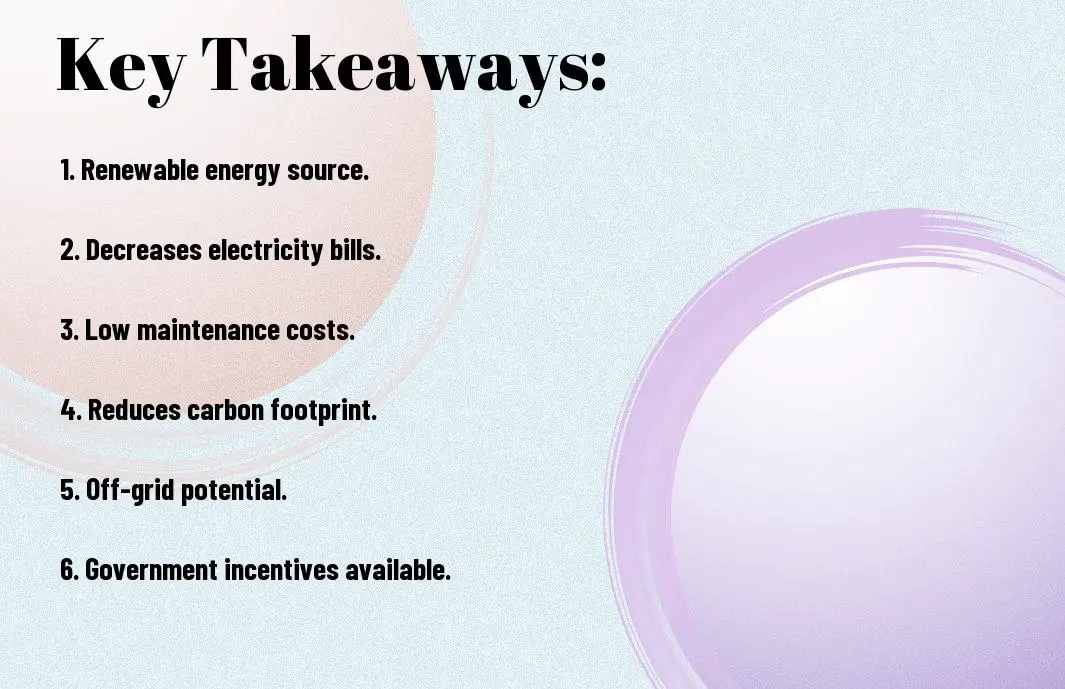Solar energy is a remarkable source of renewable energy that holds immense potential in reshaping our energy sector and combating climate change. Harnessing the power of the sun offers various advantages over traditional fossil fuels, including a clean, sustainable, and abundant source of power. Not only does solar energy reduce greenhouse gas emissions and decrease our reliance on finite resources, but it also provides energy independence, lower electricity bills, and creates new job opportunities in a rapidly growing industry. The advantages of solar energy are undeniable, making it a crucial component in the transition towards a more sustainable and environmentally friendly future.
Key Takeaways:
- Clean Energy: Solar energy is a renewable and clean source of power that does not produce greenhouse gases or other harmful pollutants.
- Cost Savings: Investing in solar energy can lead to long-term cost savings on electricity bills, maintenance, and transportation of fuel.
- Energy Independence: By harnessing solar power, individuals and communities can reduce their reliance on fossil fuels and decrease their carbon footprint.
Economic Benefits of Solar Energy
Obviously, there are numerous economic benefits to utilizing solar energy as a renewable source of power. In addition to helping the environment, solar energy offers financial advantages that make it a wise investment for both individuals and businesses.
Reduction in Electricity Bills
Benefits of installing solar panels include a significant reduction in electricity bills. By generating your own electricity from the sun’s rays, you can drastically cut your monthly utility expenses. Over time, the savings can accumulate and contribute to the overall financial well-being of the property owner.
Moreover, in some regions, homeowners can sell excess electricity generated by their solar panels back to the grid through net metering programs, earning additional income or credits on their utility bills. This not only offsets energy costs but also offers a potential revenue stream from solar energy production.
Job Creation and Economic Growth
Economic growth and job creation are significant benefits of the solar energy industry. The demand for solar technologies has led to the expansion of manufacturing facilities, installation services, and research and development initiatives in many countries around the world.
For instance, the United States has seen a surge in jobs related to solar energy, with a variety of opportunities in construction, manufacturing, sales, and installation. The growth of the solar sector not only creates new employment options but also contributes to overall economic prosperity by supporting local businesses and stimulating economic development.
Environmental Impact
Reduction of Greenhouse Gas Emissions
Greenhouse gas emissions are a significant contributor to global warming and climate change. Traditional methods of generating electricity, such as burning fossil fuels, release harmful gases like carbon dioxide into the atmosphere. Solar energy, on the other hand, generates electricity without any emissions, making it a clean and sustainable alternative. By harnessing the power of the sun, we can significantly reduce our carbon footprint and combat the effects of climate change.
Decrease in Water Usage and Pollution
Environmental sustainability is a key benefit of solar energy. Unlike thermal power plants that require vast amounts of water for cooling and operation, solar panels do not need water to generate electricity. This decrease in water usage helps conserve this precious resource and reduces the strain on freshwater supplies. Additionally, solar energy production does not result in water pollution or contamination, further protecting our ecosystems and aquatic life.
Decrease in Water Usage and Pollution: Solar energy not only reduces water consumption but also minimizes the release of pollutants into our water sources. Traditional energy sources like coal and natural gas plants contribute to water pollution through the discharge of toxic chemicals and heavy metals into rivers and streams. By transitioning to solar power, we can preserve water quality and safeguard our environment for future generations.
Solar Energy in Residential and Commercial Sectors
Despite the initial costs, solar energy offers numerous advantages for both residential and commercial sectors. Utilizing clean and renewable energy from the sun reduces electricity bills, lowers carbon footprint, and increases energy independence.
Solar Solutions for Homeowners
Homeowners can benefit greatly from solar solutions by installing photovoltaic panels on their rooftops. This investment not only cuts down on electricity costs but also add value to the property. Incentives such as tax credits and rebates make the transition to solar energy more affordable than ever.
Additionally, net metering allows homeowners to sell excess energy back to the grid, earning credits that can offset future energy bills. With advancements in technology, solar panels have become more efficient and durable, making them a long-term and sustainable investment for homeowners.
Integration of Solar Power in Businesses
Businesses are increasingly realizing the benefits of integrating solar power into their operations. By harnessing the sun’s energy, companies can reduce operating costs and demonstrate their commitment to sustainability. Energy generated from solar panels can power offices, warehouses, and manufacturing facilities, lowering dependence on traditional energy sources.
Energy from the sun is abundant and readily available, providing a reliable source of power for businesses. Integrated solar systems not only contribute to a greener environment but also enhance the reputation of businesses as sustainable and socially responsible entities.
Drawbacks and Considerations
Initial Investment and Cost Factors
For many individuals and businesses considering a switch to solar energy, the initial investment can be a major deterrent. The cost of purchasing and installing solar panels, inverters, and other necessary equipment can require a significant amount of capital upfront. Additionally, factors such as roof condition, shading, and available space can impact the total cost of a solar energy system.
- Cost: The initial investment for a solar energy system can be substantial, potentially deterring some from making the switch.
- Factors: Considerations such as roof condition, shading, and available space can impact the total cost of a solar energy system.
Recognizing the long-term benefits and cost savings of solar energy can help justify the initial investment for many individuals and businesses.
Intermittency and Storage Challenges
Investment in solar energy is not without its challenges, particularly when it comes to intermittency and storage. Unlike traditional power sources, solar energy production is dependent on sunlight, meaning energy generation fluctuates based on weather conditions and time of day. This can result in periods of energy scarcity, requiring backup solutions or integration with energy storage systems such as batteries.
Recognizing the importance of developing efficient storage solutions and implementing strategies to address intermittency challenges will be crucial in maximizing the potential of solar energy as a sustainable power source.
Practical Advancements and Future of Solar Energy
Innovations in Solar Technology
Now with the rapid advancements in solar technology, harnessing the power of the sun has become more efficient than ever before. An increasing number of innovations in the solar industry are driving down costs and improving the performance of solar panels. Scientists and engineers are constantly exploring new materials and designs to enhance the efficiency of solar cells.
An exciting development in solar technology is the integration of solar panels into building materials such as roof shingles and windows. This not only makes solar power more visually appealing but also enables seamless integration of renewable energy sources into urban environments.
Trends in Global Solar Energy Usage
Energy trends show a significant rise in global solar energy usage as countries strive to reduce their carbon footprint and transition to cleaner energy sources. With the declining costs of solar panels and the implementation of favorable government policies, solar energy has witnessed a surge in installations worldwide. Developing countries are particularly embracing solar power as a cost-effective and sustainable solution to meet their growing energy demands.
With the increasing awareness of climate change and the need to shift towards renewable energy sources, solar power is expected to play a crucial role in the global energy landscape. The potential for further advancements in solar technology and the scalability of solar installations indicate a bright future for solar energy.
To wrap up
Considering all points, it is evident that harnessing the power of the sun through solar energy has numerous advantages. From its environmental benefits to its cost-efficiency and sustainability, solar energy offers a clean and renewable source of power for the future. As technology continues to advance, the potential for solar energy to become even more accessible and widespread is promising. Embracing solar energy not only reduces our reliance on finite fossil fuels but also paves the way for a more sustainable and eco-friendly energy landscape. The power of the sun holds immense potential for shaping a brighter and greener future for generations to come.
FAQ
Q: What are the advantages of solar energy?
A: Solar energy is a renewable and sustainable source of power that is environmentally friendly, reduces electricity bills, and helps to reduce reliance on fossil fuels, leading to a decrease in carbon emissions and pollution.
Q: How does solar energy work?
A: Solar panels, composed of photovoltaic cells, capture sunlight and convert it into electricity through the photovoltaic effect. This electricity can then be used to power homes, businesses, and even entire cities.
Q: Are there any financial benefits to using solar energy?
A: Yes, there are several financial benefits to using solar energy, including lower electricity bills, potential tax incentives and rebates, increased property value, and the opportunity to sell excess electricity back to the grid through net metering programs.










